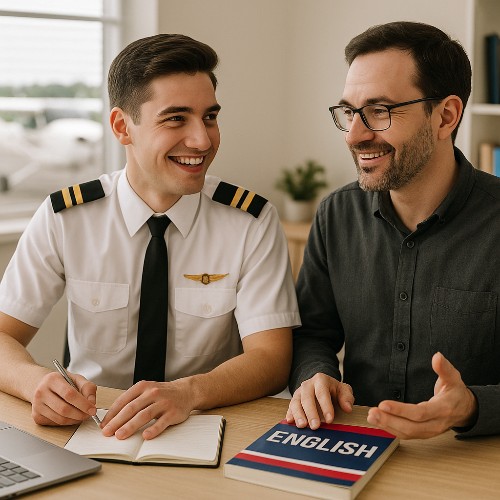Why a private tutor for english speaking is right for you
 Private tutor for English speaking
Private tutor for English speakingYou'll need a private tutor for English speaking if you're serious about being a pilot.
Learning to fly is both exciting and challenging. For student pilots who speak English as a second language, flight training can be even more difficult.
Aviation is an international field, and English is the standard language used for all communication between pilots and air traffic controllers. Understanding and speaking aviation English clearly is not just a skill — it’s a safety requirement.
For this reason, foreign student pilots should consider hiring a private aviation English tutor. This decision can lead to better communication, stronger test performance, and safer flying overall.Your first block of text...
1. Improved Aviation
Communication Skills
Aviation English is not the same as everyday English. It uses specific phrases, vocabulary, and pronunciation standards based on ICAO (International Civil Aviation Organization) regulations. For example, instead of saying “I understand,” pilots say “Roger.” Instead of “Yes,” they say “Affirm.” These standard phrases reduce confusion and ensure clarity, especially in fast-paced or high-stress situations.
So you'll need to get a private tutor for English speaking who is an expert in ICAO phraseology.
A private aviation English tutor focuses on teaching these specific language skills. The tutor can help the student practice standard phraseology, radio communications, and listening skills. Unlike a general English class, a private tutor tailors lessons to real-world flight scenarios and helps the student become confident in using the correct terms with the right pronunciation. This focused training can significantly improve both speaking and listening comprehension.
2. Preparation for ICAO Language Proficiency Test
To obtain a pilot’s license, most student pilots must pass an ICAO English Language Proficiency Test. This test evaluates pronunciation, grammar, vocabulary, fluency, comprehension, and interaction in aviation-related communication. A private tutor understands what the test requires and can provide direct feedback on weak areas.
With one-on-one lessons, the tutor can simulate test scenarios, correct mistakes, and provide practice with typical questions. This gives the student a better chance of scoring ICAO Level 4 or higher — the level required to fly internationally. A good tutor also helps reduce test anxiety by offering plenty of practice and support, helping the student feel more prepared and relaxed during the actual exam.
3. Confidence in Real-World Flight Operations
During real flights, there is no time to translate from your native language to English. Radio communication must be quick, clear, and accurate. Misunderstandings can lead to serious safety issues. A private aviation English tutor can simulate radio conversations between pilot and air traffic controller, helping the student develop fast and accurate responses.
Practicing with a tutor builds confidence in both controlled (towered) and uncontrolled (non-towered) airport environments. The tutor can review ATIS (Automatic Terminal Information Service), practice reading back clearances, and role-play emergency scenarios. This hands-on speaking and listening training makes student pilots more prepared for real-world situations in the cockpit.
4. Personalized Lessons
and Flexible Scheduling
One of the biggest advantages of hiring a private tutor is flexibility. Unlike group classes, private tutoring allows the student to learn at their own pace. If the student struggles with pronunciation, the tutor can spend more time on that area. If the student wants to prepare for a checkride or improve listening skills for live ATC, the tutor can adjust the lessons accordingly.
Private tutors often offer flexible scheduling, allowing students to learn around their flight training and personal schedules. This personalized attention helps students improve faster and stay motivated.
Read more on how to find a private English tutor near you for aviation.
5. Cultural and Professional Integration
Many international students face cultural challenges when training in a different country. A tutor who understands both aviation and language learning can also help students understand common American or international aviation culture, phraseology habits, and cockpit behavior. This knowledge helps students avoid communication mistakes that may seem small but can have serious consequences in aviation.
Moreover, strong English skills help student pilots fit into flight schools more easily, make professional connections, and prepare for international careers. A private aviation English tutor can be a bridge between the student’s home culture and the aviation world they’re training in.
6. Faster Progress and
Long-Term Benefits
Students who struggle with English often take longer to complete flight training, which increases the cost. By hiring a private tutor, foreign student pilots can improve their English more quickly, stay on track with flight lessons, and pass exams with less delay. This leads to time and cost savings in the long run.
Strong English communication skills also benefit pilots throughout their careers. Whether flying for an airline, cargo company, or in general aviation, the ability to communicate clearly in English remains critical. Hiring a private aviation English tutor is not just an investment in language skills — it’s an investment in a safer, more successful aviation career.
consider our team for private tutor for english speaking
For foreign student pilots, clear English communication is more than a helpful skill — it’s a requirement for safety, success, and certification. A private aviation English tutor provides customized support, focused training, and confidence-building practice in both spoken and listening skills. From test preparation to real-world radio communication, an English as second language tutor helps students overcome language barriers and become professional, competent, and confident pilots.